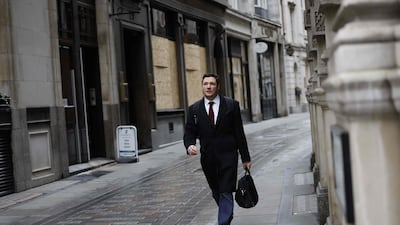The City of London is planning a ‘back to work’ week in April to revive the financial district after the Square Mile was virtually closed down during the Covid-19 pandemic.
The financial hub will urge office workers to return for a ‘reopening’ week in the spring to boost the bars, restaurants and other venues across the financial district that rely on employees being in offices, according to William Russell, the lord mayor of London.
"There is a big plan. We can bring together the businesses, the hospitality, the culture and get a whole load of people coming back," Mr Russell told the Financial Times.
Companies located in the financial hub first directed their staff to work from home when the UK's first lockdown began in March.
An initial plan to get staff back into the office in late September, following a summer of lower numbers of Covid cases, was abandoned after a series of new government curbs were unveiled over the course of the month to control a subsequent escalation.
As a result, office buildings have remained mostly empty as employers follow government advice to work from home where possible. This has made it hard for the restaurants, cafes and other businesses that serve the Square Mile to survive.
Now London is on track to be placed in the toughest tier of coronavirus restrictions this week after new data revealed the UK capital has the highest rate of cases in England.
While Mr Russell does not expect a flood of office workers to return to the Square Mile before the spring, by April many hope the rollout of the vaccine will have had a significant effect on reducing the number of cases.
"January and February will be tough. We have to survive those couple of months and hopefully come back with a bang in springtime. I want everyone to buy in on this reopening," he said.
The former Merrill Lynch investment banker acknowledged that some employees will be more nervous than others about returning to work where the risk of catching the virus is higher. But he is confident staff will return despite a potential shift in how the professional world works.
Employers expect working from home to average two days per week, according to a survey this month by Barclays.
The “WFH revolution” translates into a “10 per cent to 20 per cent structural reduction” in office demand, with the UK the most vulnerable, according to the global report.

To lure the more than 500,000 people that were going into the office in February to return, Mr Russell has asked Transport for London to reopen the Waterloo and City line ahead of April's ‘back to work’ week, which was closed in March.
“In February, we had over 500,000 people coming into the Square Mile every day and that is going to take a long time to get back to,” he said.
In October, a study by UK accountancy consultancy Theta Global Advisors found more than half of City of London workers would not return to the office.
Forty-five per cent of those polled said the pandemic had made them realise what a poor work-life balance they had pre-lockdown, something they don’t plan to return to in future.
The Square Mile pledged to reinvent itself and emerge stronger from the Covid-19 pandemic, recharging the capital by 2025 with new start-up hubs, affordable work spaces, digital funds and entrepreneur-friendly stock exchange reforms.
Mr Russell, who heads the City of London Corporation, which oversees operation in the Square Mile, decided to stay in his unpaid position for a second term in November to provide continuity during the pandemic, becoming only the second mayor to do so.
He is optimistic about the post-Covid future of the City, saying the financial hub can grow, particularly in areas such as green finance and FinTech.
He also believes the City can withstand the effects of Brexit, despite nerves from financial services companies that a no-deal Brexit will cause them to lose clients and influence.
According to Ernst & Young, 7,500 City workers have already relocated, with finance companies transferring more than £1.2 trillion ($1.59tn) in assets to the EU since Britain's referendum on EU membership in 2016.
The Bank of England said on Friday that UK banks remained "resilient" to the risks of Brexit and the coronavirus. But it warned that some EU-based firms might face problems providing cross-border services, and vice versa.
From January 1, Britain's financial sector will lose a European "passport" that allows it to sell products and financial services across the EU.
The City is also worried about talk of an "equivalence" regime of compatible rules that in theory would keep the financial taps running but in practice could be easily revoked.
The EU has already given the go-ahead for derivatives clearing houses, which underwrite more than $1tr in transactions every day, but it has not confirmed plans for trading.
"If the UK and EU have a more acrimonious relationship, it could take longer to get these equivalence decisions," said Sarah Hall, from the UK in a Changing Europe think tank.


